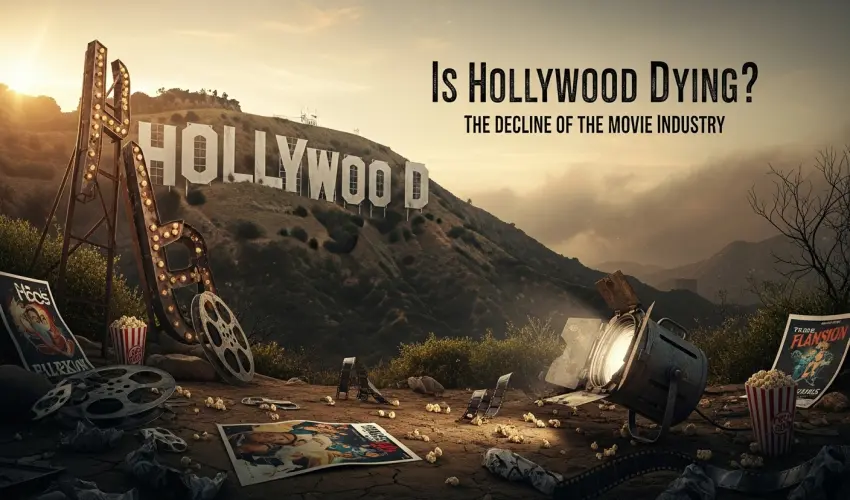Is Hollywood Dying? The Decline of the Movie Industry
Published Aug 30, 2025
1 0
Key Takeaways
-
Hollywood is not dying, but it is struggling. Declining box office, creative stagnation, and changing viewer habits are serious threats.
-
Streaming platforms have redefined content consumption. Convenience now trumps tradition, and theatres have lost their dominance.
-
Audiences want originality. The overreliance on sequels and reboots is leading to fatigue and disengagement.
-
Global competition is rising. International films are gaining popularity and credibility, challenging Hollywood’s status.
-
Reinvention is essential. For Hollywood to thrive, it must prioritize storytelling, innovation, and audience connection over profits and formulas.
Introduction
For over a century, Hollywood has been the beating heart of global entertainment. It’s the land of stars, iconic directors, red carpets, and blockbuster dreams. But as streaming services surge, box office numbers dwindle, and original storytelling fades, one question looms large: Is Hollywood dying?
This article dives deep into Hollywood’s struggles and transitions, examining whether the film capital is on its deathbed or simply undergoing an overdue transformation.
The Golden Era: A Bygone Dream
Once upon a time, Hollywood was untouchable. From the 1930s to the 1960s, the studio system ruled the industry. Stars like Clark Gable, Marilyn Monroe, and Cary Grant were household names. Directors like Alfred Hitchcock and Billy Wilder crafted timeless classics. Movies were a cultural event, a communal experience that drew in millions.
But times change. Audiences evolved. Technology surged ahead. And somewhere along the way, Hollywood’s monopoly began to unravel.
The Streaming Revolution: How Viewer Habits Changed
Today, the way we watch movies has changed completely. Streaming platforms like Netflix, Hulu, Disney+, and Amazon Prime Video have revolutionized consumption. Why get dressed and drive to a theatre when you can binge new releases from your couch?
Younger generations aren’t emotionally tied to the “cinema experience.” They value convenience, content variety, and instant access. As a result, theatre attendance has dropped significantly. Hollywood’s reliance on big opening weekends and box office metrics is no longer a sustainable model.
The COVID-19 Catalyst
The COVID-19 pandemic didn’t kill Hollywood, but it certainly accelerated its decline. Movie theatres shut down, productions halted, and blockbusters were postponed or sent straight to streaming. People got used to staying home and discovered a world of international content and indie films. Even after restrictions lifted, many never returned to theatres with the same frequency.
Big Budgets, Bigger Risks: The Financial Dilemma
Modern blockbusters routinely exceed $200 million in production and marketing costs. Yet, many of these films fail to recoup their investments. Audiences are tired of seeing the 10th installment of a franchise.
Movies like The Flash, Indiana Jones 5, and even recent Marvel titles have underperformed. High budgets no longer guarantee high returns. Hollywood is stuck in a risky cycle: overspend, under-deliver, repeat.
Streaming vs. Theatres: A Tug of War
Streaming has become Hollywood’s greatest competitor and its reluctant savior. On one hand, platforms like Netflix have democratized access to content. On the other, streaming has diluted the cultural impact of movies. A theatrical release used to mean something; now, many films premiere on a homepage and disappear within weeks. Theatres aren’t obsolete, but they’re no longer the gatekeepers.
The Creativity Crisis: An Obsession with Sequels and Reboots
Original storytelling once defined Hollywood. Today, it has become rare. Studios chase intellectual property, comic books, video games—anything with built-in brand recognition. This obsession with the familiar has stifled creativity.
Meanwhile, independent filmmakers and international studios are taking risks, telling bold stories, and being rewarded for it. Films like Parasite and Everything Everywhere All At Once proved that audiences are hungry for originality. Hollywood, unfortunately, is playing it too safe.
Scandals and a Decline in Public Trust
Hollywood’s image has taken a hit in recent years. The #MeToo movement revealed a toxic culture of abuse and power imbalance. These scandals shattered illusions and eroded public trust. Combined with growing skepticism about celebrity culture, Hollywood has lost much of its cultural authority.
The Rise of Global Competition
Hollywood no longer holds a monopoly on cinematic excellence. Korean, Indian, Nigerian, and European cinemas are booming. Thanks to streaming, global audiences have discovered that Hollywood isn’t the only game in town. Films like Squid Game and RRR have captured global attention by offering unique perspectives and cultural authenticity often missing from formulaic Hollywood productions.
Conclusion: Is Hollywood Really Dying?
So, is Hollywood truly dying? Not quite. But it is in decline, and transformation is essential. The old ways don’t work anymore. The blockbuster formula is broken, and audiences are no longer captive.
For Hollywood to survive, it must embrace originality, value diversity, invest in fresh voices, and strike a new balance between streaming and the cinematic experience. It must respect the intelligence of its audience and regain their trust. The golden age may be over, but a new era could still be on the horizon—if Hollywood is brave enough to evolve.








